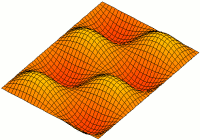Resonator




Resonator refers to a device or system that naturally oscillates at some frequencies, called its resonance frequencies, with greater amplitude than at others. The principles of resonance find applications across various fields, including physics, engineering, acoustics, and electronics. Resonators are used to either generate waves of specific frequencies or to select specific frequencies from a signal. They play a crucial role in many devices, from simple musical instruments to advanced lasers and quantum computers.
Types of Resonators[edit]
Resonators can be broadly classified into two categories: mechanical and electromagnetic.
Mechanical Resonators[edit]
Mechanical resonators work on the principle of mechanical vibrations. Examples include tuning forks, which resonate at a specific pitch when struck, and quartz crystals used in quartz watches and oscillators. These devices rely on the physical properties of materials to produce a precise frequency.
Electromagnetic Resonators[edit]
Electromagnetic resonators involve the resonance of electromagnetic waves. They include:
- Cavity resonators, which are used in microwave ovens and certain types of radars.
- Optical resonators, which are fundamental in the operation of lasers, trapping light between two or more mirrors to create standing waves.
- LC circuits (inductor-capacitor circuits), used in radio transmitters and receivers to select a specific frequency from a broad spectrum of signals.
Applications[edit]
Resonators have a wide range of applications:
- In musical instruments, where they amplify sound at certain frequencies to produce musical notes.
- In timekeeping devices, where the regular vibrations of quartz crystals help in keeping precise time.
- In telecommunications, resonators filter out unwanted frequencies and stabilize the frequency of signals.
- In sensors and actuators, to detect or produce vibrations at specific frequencies.
- In medical devices, such as MRI machines, where they help in creating images of the body's interior.
Design and Operation[edit]
The design of a resonator depends on its intended use. Mechanical resonators might be designed based on the size, shape, and material properties to achieve the desired frequency. Electromagnetic resonators are often designed considering the wavelength of the electromagnetic waves they are meant to resonate with. The quality of a resonator, indicating how selectively it can resonate at the desired frequency, is measured by its Q factor. A higher Q factor indicates a narrower range of frequencies around the resonance frequency.
Challenges and Innovations[edit]
One of the main challenges in designing resonators is managing losses, which can dampen the resonance. In mechanical resonators, this might be due to material imperfections or energy leakage. In electromagnetic resonators, losses can occur due to imperfect conductors or dielectric losses in insulators. Advances in materials science and engineering have led to the development of high-Q resonators for various applications, from ultra-stable oscillators for timekeeping to high-power lasers for cutting and welding.
Conclusion[edit]
Resonators are fundamental components in a wide array of devices and systems, harnessing the principle of resonance to filter, generate, or amplify frequencies. Their design and operation are critical in fields ranging from telecommunications to medical imaging, making them a cornerstone of modern technology.
| This article is a stub. You can help WikiMD by registering to expand it. |
Ad. Transform your life with W8MD's Budget GLP-1 injections from $75


W8MD offers a medical weight loss program to lose weight in Philadelphia. Our physician-supervised medical weight loss provides:
- Weight loss injections in NYC (generic and brand names):
- Zepbound / Mounjaro, Wegovy / Ozempic, Saxenda
- Most insurances accepted or discounted self-pay rates. We will obtain insurance prior authorizations if needed.
- Generic GLP1 weight loss injections from $75 for the starting dose.
- Also offer prescription weight loss medications including Phentermine, Qsymia, Diethylpropion, Contrave etc.
NYC weight loss doctor appointmentsNYC weight loss doctor appointments
Start your NYC weight loss journey today at our NYC medical weight loss and Philadelphia medical weight loss clinics.
- Call 718-946-5500 to lose weight in NYC or for medical weight loss in Philadelphia 215-676-2334.
- Tags:NYC medical weight loss, Philadelphia lose weight Zepbound NYC, Budget GLP1 weight loss injections, Wegovy Philadelphia, Wegovy NYC, Philadelphia medical weight loss, Brookly weight loss and Wegovy NYC
|
WikiMD's Wellness Encyclopedia |
| Let Food Be Thy Medicine Medicine Thy Food - Hippocrates |
Medical Disclaimer: WikiMD is not a substitute for professional medical advice. The information on WikiMD is provided as an information resource only, may be incorrect, outdated or misleading, and is not to be used or relied on for any diagnostic or treatment purposes. Please consult your health care provider before making any healthcare decisions or for guidance about a specific medical condition. WikiMD expressly disclaims responsibility, and shall have no liability, for any damages, loss, injury, or liability whatsoever suffered as a result of your reliance on the information contained in this site. By visiting this site you agree to the foregoing terms and conditions, which may from time to time be changed or supplemented by WikiMD. If you do not agree to the foregoing terms and conditions, you should not enter or use this site. See full disclaimer.
Credits:Most images are courtesy of Wikimedia commons, and templates, categories Wikipedia, licensed under CC BY SA or similar.
Translate this page: - East Asian
中文,
日本,
한국어,
South Asian
हिन्दी,
தமிழ்,
తెలుగు,
Urdu,
ಕನ್ನಡ,
Southeast Asian
Indonesian,
Vietnamese,
Thai,
မြန်မာဘာသာ,
বাংলা
European
español,
Deutsch,
français,
Greek,
português do Brasil,
polski,
română,
русский,
Nederlands,
norsk,
svenska,
suomi,
Italian
Middle Eastern & African
عربى,
Turkish,
Persian,
Hebrew,
Afrikaans,
isiZulu,
Kiswahili,
Other
Bulgarian,
Hungarian,
Czech,
Swedish,
മലയാളം,
मराठी,
ਪੰਜਾਬੀ,
ગુજરાતી,
Portuguese,
Ukrainian